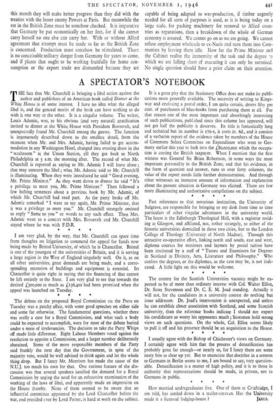The debate on the proposed Royal Commission on the Press
on Tuesday was a patchy affair, with some good speeches on either side and some far otherwise. The fundamental questions, whether there was really a case for a Royal Commission, and what such a body could be expected to accomplish, were for most of the debate buried under a mass of irrelevancies. The decision to take the Party Whips off made little difference. Eight Labour Members voted against the resolution to appoint a Commission, and a larger number deliberately abstained. Some of the more responsible members of the Party said frankly the next day that the Government, in spite of the majority vote, would be well advised to think again and let the whole thing drop. But I fancy Mr. Morrison has made the cause of the N.U.J. too much his own for that. One curious feature of the dis- cussion was that several speakers justified the demand for a Royal Commission by urging the need for an exhaustive examination of the working of the laws of libel, and apparently made an impression on the House thereby. None of them seemed to be aware that an influential committee appointed by the Lord Chancellor before the war, and presided ever by Lord Porter, is hard at work on the subiect.


































 Previous page
Previous page